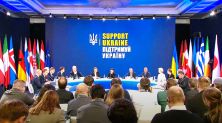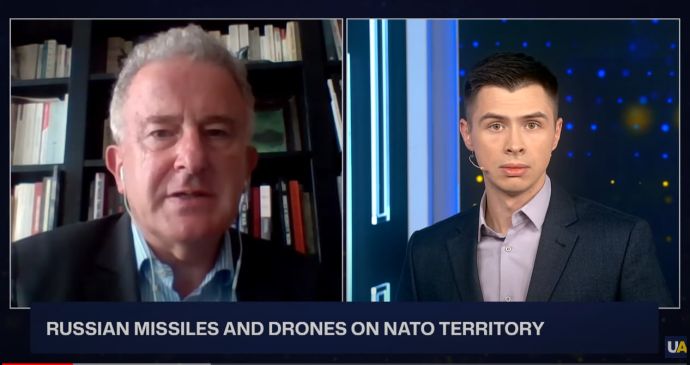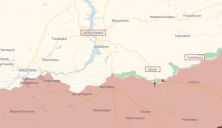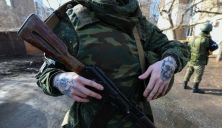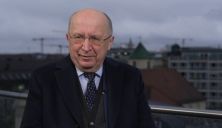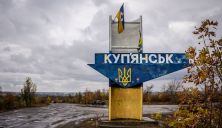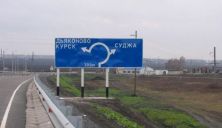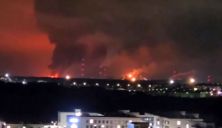Why do NATO countries not react to the fall of drones on their territory? Why does Belarus shoot down Russian drones? How should the alliance react? And what was the reason for Russia’s full-scale war against Ukraine?
Here is an interview with Nicolas Tenzer, Non-resident senior fellow at the Center for European Policy Analysis and Chairman of the Center for Studies and Research on Political Decision. Author of “Our War. Crime and Oblivion”
— So, John Kirby, National Security Council Coordinator for Strategic Communications at the White House, has commented on the recent violation of the airspace of Latvia and Romania by Russian combat drones.
Unfortunately, this is not a new development, as it has happened throughout the war in Ukraine where missile or drone fragments sometimes end up in NATO countries.
The White House has not taken the attack by Russian drones falling in NATO countries seriously, and NATO countries haven’t shot them down. What do you think about that?
— First of all, I think the reaction is quite weak. As you rightly mentioned, this is not the first time a NATO country has been affected by Russian missiles or drones, even if unintentionally. I don’t believe it’s entirely accidental that these drones end up in such countries.
It’s a signal, as Putin is testing the readiness and resolve of NATO. For now, it seems that NATO, especially under U.S. leadership, has decided not to respond strongly.
There might be a hesitation on the part of the U.S., thinking it’s too early to trigger Article 4, or even Article 5 of NATO, but I believe this is a clear signal.
If the U.S. and its allies do not respond firmly when Russia is attacking Ukraine, then the credibility of NATO itself could be questioned if Russia were to target NATO countries directly.
In my view, this is a dangerous precedent of not responding robustly to these types of attacks.
— It’s quite frightening. If Russia were to attack Baltic countries or Romania on land, what would NATO’s response be? Could it be delayed as well?
— Of course, that’s part of the deterrence game. There must be some unpredictability about NATO’s response, which is key in deterrence. However, deterrence is not just about nuclear deterrence—it’s about conventional deterrence.
If the Allies rely solely on nuclear protection, that’s missing the point. The real question is whether the U.S., along with the UK, Germany, France, and other capable nations, are ready to take conventional action in response to Russian attacks.
I believe that should have been the message sent when Ukraine was first attacked, not just after February 24, 2022, but even back in 2014.
Even though Ukraine is not a NATO member yet, Russia’s attacks on Ukraine challenge the legitimacy of NATO itself.
In essence, when Russia attacks Ukraine, it indirectly targets NATO as well.
From my perspective, what we’ve seen over the past two and a half years is a gradual retreat by NATO in fulfilling its duties—not because of the organization itself, but because of the hesitance of the major allies, particularly the U.S.
— Belarus has been shooting down Russian drones, showing decisiveness. Do you think this could reinforce anti-NATO sentiments and skepticism in Europe, especially if NATO doesn’t act?
— Yes, absolutely. Euroskeptics could argue, “What is NATO for?” or “What is the EU for?” Both NATO and the EU have obligations to defend their member states. The situation with Belarus is interesting because the Lukashenko regime survives only due to Russian support. Yet, Belarus has shown reluctance to fully align with Russia in the war, signaling they don’t want to engage in direct conflict with Ukraine.
It’s ironic that a country like Belarus is doing something NATO hasn’t—shooting down Russian drones. I don’t expect major changes in U.S. policy during the remainder of Biden’s term, but if Kamala Harris is elected in 2024, I hope her administration will break with what I see as the disastrous legacies of Obama and Biden in handling Russian aggression.
I believe Obama’s inaction after the chemical attacks in Syria in 2013 sent a clear signal to Putin that he could act freely, leading to the 2014 invasion of Ukraine.
Similarly, the chaotic U.S. withdrawal from Afghanistan in 2021 likely gave Putin the confidence to launch a full-scale invasion of Ukraine in 2022.
If Kamala Harris is elected, I hope she will understand that this kind of restrained policy has clearly failed.
Read also: The “Tenet Media” Scandal. Interview with Professor Darin Gerdes
